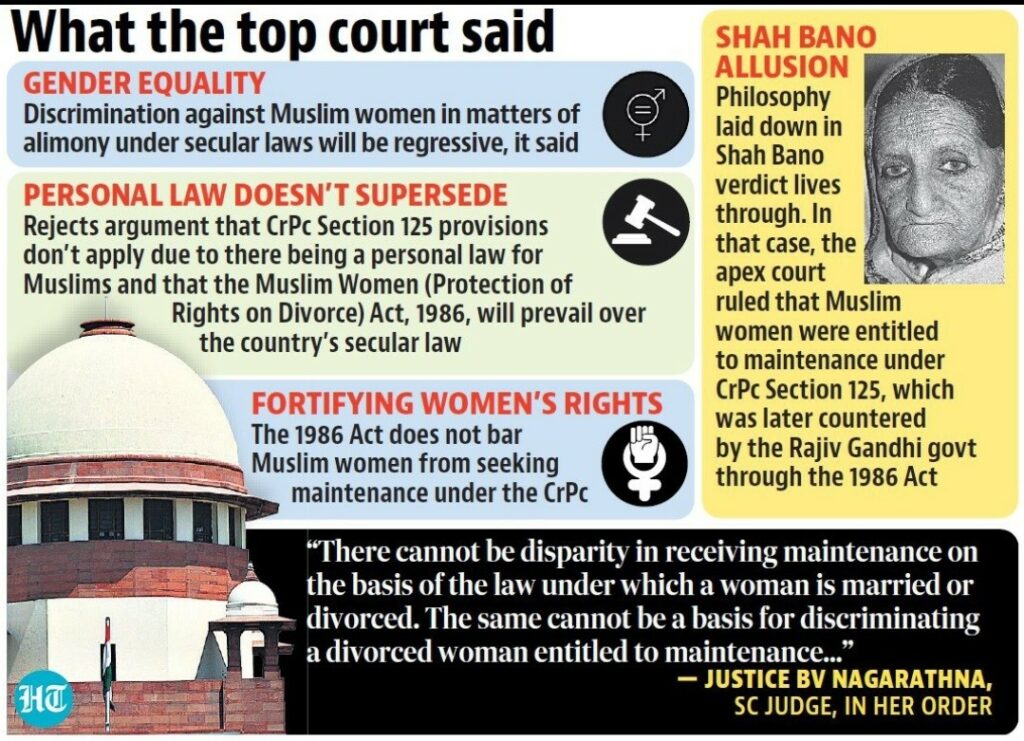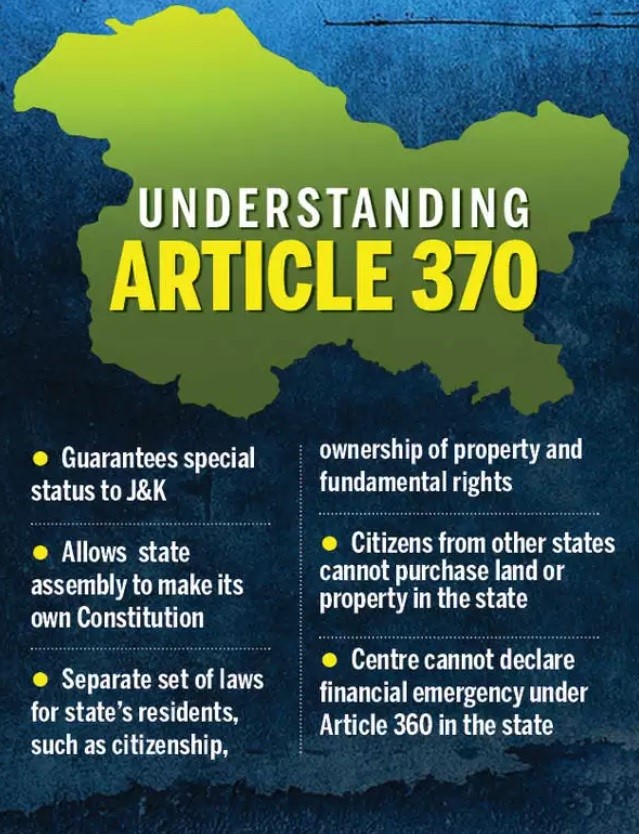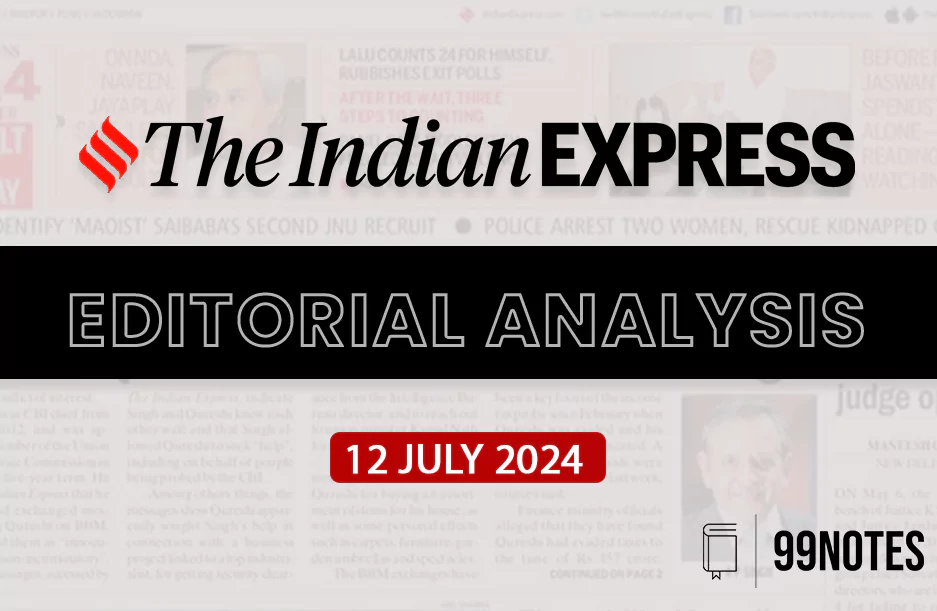12 July 2024 : Indian Express Editorial Analysis
1. RIGHTING A WRONG
(Source: Indian Express; Section: The Editorial Page; Page: 10)
| Topic: GS2– Social Justice |
| Context: |
|

Significance of the Judgment
- The importance of this judgment lies in its reaffirmation of the principles of justice and gender equality.
- Section 125 of the CrPc, which has existed since 1973, is designed to provide maintenance to wives, children, and parents irrespective of religion.
- The ruling underscores the necessity of upholding pluralism in a secular democracy while distinguishing between cultural diversity and unjust patriarchal practices.
- The Quran itself emphasizes the provision of maintenance to wives after divorce, yet many husbands exploit legal loopholes to evade this responsibility, as seen in the Shah Bano case of 1985.
Historical Context: The Shah Bano Case
- The Shah Bano case is a significant reference point in the discussion of Muslim women’s rights in India.
- In 1985, the Supreme Court granted maintenance to Shah Bano, a divorced Muslim woman, under Section 125. However, her husband refused to comply with the ruling, leading to a national controversy.
- Conservative clerics and leaders vehemently opposed the ruling, arguing that it interfered with Shariat and minority rights.
- Bowing to pressure, the Rajiv Gandhi-led government overturned the Supreme Court’s decision by enacting a separate Shariat-compliant law, thereby denying Shah Bano her maintenance.
- This incident highlighted the tension between secular laws and personal laws and sparked political debates on religious division and minority appeasement.
Legal Disparities and the Need for Reform
- Despite India’s secular framework, Muslim women have long been denied legal parity with their Hindu and Christian counterparts, who are protected by reformed personal laws.
- The Indian Muslims are governed by the Shariat Application Act of 1937, an outdated law that delegates personal law matters to Shariat.
- In practice, this has led to the persistence of unjust practices based on arbitrary interpretations of Islamic law.
- Issues like age of marriage, divorce, maintenance, polygamy, and custody are often decided by patriarchal norms rather than legal clarity.
- The rights to consent and mehr, fundamental to Islamic marriage, are frequently diluted in practice, leaving women vulnerable and unaware of their rights.
Resistance to Reform and the Role of Patriarchy
- Efforts to reform Muslim personal laws have faced strong resistance from conservative clergy who argue that Islam granted rights to women 1,400 years ago. However, these rights are not always accessible to women in practice.
- Reform advocates are often demonized and accused of promoting Western or Hindutva ideologies.
- Consequently, Muslim women continue to be deprived of both their Quranic and constitutional rights.
- Despite the religious polarization in India, the plight of Muslim women is used to negatively portray the community, exacerbating their fear and insecurity.
- However, there is a growing consciousness about women’s rights within the community, and many support progressive judgments like the recent Supreme Court ruling.
Moving Towards Legal Equality
- The Supreme Court’s recent judgment is a significant step towards achieving legal equality for Muslim women.
- In 2017, the Court outlawed instant triple talaq, another practice that lacked Quranic sanction and was detrimental to women’s rights.
- The current judgment further emphasizes that maintenance should be viewed as a fundamental right, not as charity.
- Justice Nagarathna highlighted that this right transcends religious boundaries, reinforcing the idea that gender justice is a constitutional obligation.
- While social attitudes still play a crucial role, an enabling legal framework can empower women to fight for their rights and achieve justice.
| What is the Muslim Women (Protection of Rights on Divorce) Act, 1986? |
|
Purpose:
Provisions:
Evolution:
Shabana Bano v. Imran Khan Case, 2009:
|
|
PYQ: Which Article of the Constitution of India safeguards one’s right to marry the person of one’s choice? (2019) (a) Article 19 (b) Article 21 (c) Article 25 (d) Article 29 Ans: (b) |
| Practice Question: Discuss the significance of the recent Supreme Court judgment allowing divorced Muslim women to seek alimony under Section 125 of the Code of Criminal Procedure (CrPc). Evaluate the challenges faced in reforming personal laws in India and suggest measures to ensure gender justice within the framework of a secular democracy. (250 words/15 m) |
2. For J&K, better days lie ahead
(Source: Indian Express; Section: The Ideas Page; Page: 11)
| Topic: GS2 – Governance GS3 – Internal Security |
| Context: |
|
Abrogation of Article 370: A Step Towards Unified Governance

- The abrogation of Article 370 marks a significant shift in the governance of J&K. The special constitutional status previously allowed a divergence between the actions and words of J&K politicians, perpetuating oligopolistic, dynastic, and stale politics.
- The removal of this article addresses Syama Prasad Mookerjee’s 1950s call in Parliament for “Ek desh me do vidhan, do pradhan, do nishan nahin chalenge” (One nation cannot accept two constitutions, two heads of state, and two flags).
- Future elections in J&K will now be conducted under the Indian Constitution, introducing new electoral thresholds, ballot structures, and contexts.
- This change creates opportunities for new politicians and parties to participate in democracy, converting conflicts into trade-offs through a fresh slate of ideas that blunt passions, create interests, and forge compromises.
Military Strategy and Cross-Border Terrorism
- The belief that cross-border military strikes by India were impossible after Pakistan’s nuclear tests was shattered by the Uri and Pulwama responses.
- These strikes fulfilled the long-standing prayers of the security leadership in J&K for the hot and cold pursuit of terrorists.
- They were not acts of war-mongering but a recognition that Pakistan’s terror factory required new calculations.
- The lack of consequences for previous attacks, such as the J&K Assembly attack in 2001, led to more significant attacks like those on the Indian Parliament in 2001 and Mumbai in 2008.
- These actions established new rules and consequences for internal security strategy.
The Global Impact of Radical Islam and Counterterrorism Efforts
- The narrative of “jihad” was initially useful for the United States in drafting Mujahideen to fight the USSR in Afghanistan.
- However, the CIA’s ignorance of the myth of Bhasmasur, the demon who turns on its creator, meant that it was only a matter of time before radical Islamists turned their attention to the West.
- Early signs of this were evident in the 1990s when a US National Intelligence Council report lamented the lack of decisive action against Islamic terrorism.
- It took the 9/11 attacks for the US to recognize the dangers of radical Islam and galvanize global action on financing, training, propaganda, and weapons trade fueling terrorism.
- India’s position on cross-border terrorism is no longer isolated, making Pakistan’s strategy and actions untenable.
Pakistan’s Diminishing Geopolitical Importance
- Pakistan’s geopolitical significance, rooted in Cold War defense treaties, US-China reconciliation, and Afghan Mujahideen support, has greatly diminished since the 9/11 attacks, Osama Bin Laden’s role, and US-China rivalry.
- Internal anger is also rising against Pakistan’s economically incompetent garrison state, which weaponizes Islam and sabotages mass prosperity.
- With its per capita GDP lower than Bangladesh’s and total GDP lower than Maharashtra’s, Pakistan faces significant internal and external weaknesses.
- The abrogation of Article 370 strengthens the case for Pakistan’s awaam (public) to choose ittihad (friendship) over military-sponsored jihad.
- Although the path to a more normal democracy in Pakistan is unclear, its declining ability to get away with acts of terror is evident.
India’s Path to Prosperity and Peace
- Since 1947, India has created the world’s largest democracy but struggled to deliver mass prosperity.
- This is now changing with a massive renovation of India’s intellectual, security, financial, diplomatic, investment, welfare, and economic infrastructure.
- India is now the fifth-largest economy and will soon be third after China and the US.
- The significant export of software compared to Saudi Arabia’s oil exports gives India’s military a massive edge in a digital world where the distinction between military and civilian technology is eroding.
- The most significant change is a new political tone from the top: zero tolerance for terrorism and a vision for India to become a developed country by its 100th anniversary of independence.
| PYQ: To what extent is Article 370 of the Indian Constitution, bearing marginal note “Temporary provision with respect to the State of Jammu and Kashmir”, temporary? Discuss the future prospects of this provision in the context of Indian polity. (200 words/12.5m) (UPSC CSE (M) GS-2 2016) |
| Practice Question: Analyze the impact of the abrogation of Article 370 on the security situation in Jammu and Kashmir. Discuss how this move, combined with India’s military and diplomatic strategies, has influenced the region’s peace prospects. (250 words/15 m) |


